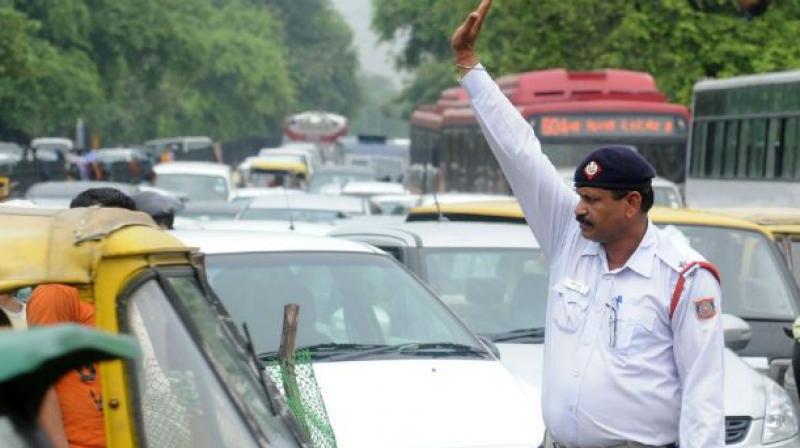Pollution reduces lung function of traffic cops
Study finds impact on traffic personnel worse than feared.

Visakhapatnam: It’s a known fact that the traffic cops manning the important intersections of the city for hours on end are prone to pulmonary function alterations. Now, a study carried out by researchers at Andhra University and Andhra Medical College have found decreased lung function in traffic police in Visakhapatnam based on pulmonary function test parameters.
The long-term exposure of traffic police personnel to noxious exhaust fumes of the motor vehicles was linked to their impaired lung function in the study. The masks provided to them hardly shield them from the emissions as the filters are not changed regularly. According to experts, the rapid growth of the city and consequent increase in vehicular traffic had contributed to the city’s high pollution levels. Long-term direct exposure to the vehicular emissions are said to produce deleterious effects on the respiratory systems. The researchers involved in the study include women scientist (WOS B) A. Anuradha and assistant professor Dr V. Lakshmi Kalpana, both from the department of human genetics of Andhra University, and assistant professor at Andhra Medical College Dr S. Narsinga Rao.
According to Dr Anuradha and Dr Kalpana, they had handpicked traffic policemen, who were exposed to vehicular exhausts for more than two years, for the study. A crosssectional study was conducted to measure the computerised spirometric parameters among 52 traffic police and they were compared with 47 general duty police. The study revealed that forced vital capacity had been significantly reduced in the traffic personnel under study, suggesting a restrictive pattern of lung disease.
The FEV1 — forced expiratory volume in one second — and PEFR — peak expiratory flow rate — tests were also significantly reduced in the traffic police, suggesting obstructive lung disease. Dr. Narsinga Rao said there was enough epidemiological evidence to show that vehicular pollution could cause increased morbidity and mortality. Traffic police has been the natural choice for studying adverse health effects from vehicular pollution due to their occupation requiring them to be in the middle of heavy traffic.
Although a number of different health effects have been reported, the majority of the studies based on the traffic police have largely focused on three specific outcomes, namely respiratory morbidity, cytogenetic effect and carcinogenic effect. The researchers opined that the public must be sensitised to the harmful effects of air pollution and one of the ways of doing this is by having them switching off their engines at the traffic signals. They also suggested in their study that the government make a provision of compulsory use of protective equi-pment (nose/ air filter masks and others) by tra-ffic policemen working at heavy traffic junctions.

